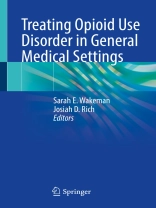This book is an invaluable reference for medical practitioners seeking to integrate opioid use disorder (OUD) treatment into general medical settings, including primary care, the inpatient hospital, and the emergency department. It recognizes opioid-related deaths in the United States as a significant public health crisis and fills the gap in drug use and addiction treatment knowledge for care providers.
Timely and concise, opening chapters examine the history of OUD pharmacology and treatment, as well as the principles of care and treatment. Subsequent chapters analyze the shortcomings of current approaches to opioid addiction, including the high cost and low value of acute care delivered by minimally trainedproviders and the fixation on short-term detoxification and rehab. The book offers specific guidance for practical integration of effective opioid use disorder treatment into a range of healthcare settings. Chapters also discuss the unique complexities of caring for special populations with OUD, such as pregnant people and those involved in the criminal legal system. The book concludes with personal experience from individuals with a history of OUD.
Socially conscious and practical, Treating Opioid Use Disorder in General Medical Settings serves as a crucial evidence-based resource for physicians, nurse practitioners, physician assistants, nurses, and other healthcare professionals.
Inhoudsopgave
1. Patient-Centered Care in Opioid Use Disorder Treatment.- 2. OUD Pharmacotherapy: A Historical perspective on how we practice, and why.- 3. Principles of Integrating Opioid Use Disorder Treatment in Primary Care.- 4. Reachable moment: hospital-based interventions.- 5. Emergency Department Treatment of Opioid Use Disorder.- 6. Treating Opioid Use Disorder in Correctional Settings.- 7. Use of the ECHO model to support treatment of opioid use disorder.- 8. The Power of Team: Introduction to Interprofessional Care Teams in Opioid Use Disorder Treatment.- 9. Integrating Recovery Coaches into Primary Care Teams.- 10. Supporting any positive change: harm reduction as an integral pillar of opioid use disorder treatment.- 11. Training medical students, residents, and fellows in opioid use disorder treatment.- 12. Bringing Primary Care to Opioid Treatment Programs.- 13. Incorporating a race equity framework into opioid use disorder treatment.- 14. Caring for pregnant and parenting women with opioid use disorder.- 15. Care for opioid use disorder in medical settings: Lived experiences.
Over de auteur
Sarah E. Wakeman, MD, FASAM
Medical Director, Massachusetts General Hospital Substance Use Disorder Initiative
Program Director, Massachusetts General Hospital Addiction Medicine Fellowship
Medical director, Substance Use Disorder, Mass General Brigham, Quality and Patient Experience
Associate Professor of Medicine, Harvard Medical School
Josiah “Jody” Rich, MD, MPH
Professor of Medicine and Epidemiology
Brown University
Director and co-Founder, The Center for Prisoner Health and Human Rights
The Miriam Hospital












